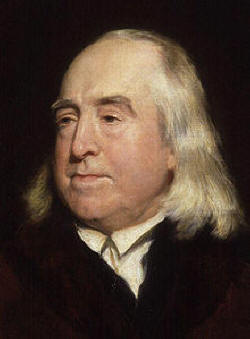
Queer Places:
University College London Bloomsbury, City of Westminster, Greater London, England, Plot end of the South Cloisters Main Building
 Jeremy Bentham[1] (15 February 1748 (4 February 1747][2] – 6 June 1832) was an English philosopher, jurist, and social reformer regarded as the founder of modern utilitarianism.[3] [4]
Jeremy Bentham[1] (15 February 1748 (4 February 1747][2] – 6 June 1832) was an English philosopher, jurist, and social reformer regarded as the founder of modern utilitarianism.[3] [4]
Bentham defined as the "fundamental axiom" of his philosophy the principle that "it is the greatest happiness of the greatest number that is the measure of right and wrong".[5] [6] He became a leading theorist in Anglo-American philosophy of law, and a political radical whose ideas influenced the development of welfarism. He advocated for individual and economic freedoms, the separation of church and state, freedom of expression, equal rights for women, the right to divorce, and the decriminalising of homosexual acts.[7] He called for the abolition of slavery, of the death penalty, and of physical punishment, including that of children.[8] He has also become known as an early advocate of animal rights.[9] Though strongly in favour of the extension of individual legal rights, he opposed the idea of natural law and natural rights (both of which are considered "divine" or "God-given" in origin), calling them "nonsense upon stilts".[10] Bentham was also a sharp critic of legal fictions.
Bentham's students included his secretary and collaborator James Mill, the latter's son, John Stuart Mill, the legal philosopher John Austin, as well as Robert Owen, one of the founders of utopian socialism. He "had considerable influence on the reform of prisons, schools, poor laws, law courts, and Parliament itself."[11]
On his death in 1832, Bentham left instructions for his body to be first dissected, and then to be permanently preserved as an "auto-icon" (or self-image), which would be his memorial. This was done, and the auto-icon is now on public display at University College London (UCL). Because of his arguments in favour of the general availability of education, he has been described as the "spiritual founder" of UCL. However, he played only a limited direct part in its foundation.[12]
Bentham said that it was the placing of women in a legally inferior position that made him choose, at the age of eleven, the career of a reformist.[13] Bentham spoke for a complete equality between sexes.
Bentham thought women inferior to men regarding such qualities as "strength of intellectual powers" and "firmness of mind".[14]
The essay ''Offences Against One's Self,''[15] argued for the liberalisation of laws prohibiting homosexual sex.[16] The essay remained unpublished during his lifetime for fear of offending public morality. It was published for the first time in 1931.[17] Bentham does not believe homosexual acts to be unnatural, describing them merely as "irregularities of the venereal appetite". The essay chastises the society of the time for making a disproportionate response to what Bentham appears to consider a largely private offence – public displays or forced acts being dealt with rightly by other laws. When the essay was published in the ''Journal of Homosexuality'' in 1978, the "Abstract" stated that Bentham's essay was the "first known argument for homosexual law reform in England".[18]
My published books:


BACK TO HOME PAGE

- ^ Jeremy Bentham, From Wikipedia, the free encyclopedia
- ^ cite web|url=https://sites.google.com/site/countyhistorian/ancestry-of-jeremy-bentham|title=Ancestry of Jeremy Bentham - countyhistorian|publisher=
- ^ cite web|url=http://www.iep.utm.edu/bentham/|title=Bentham, Jeremy |publisher= Internet Encyclopedia of Philosophy
- ^ cite web|url=http://utilitarianphilosophy.com/jeremybentham.eng.html|title=Jeremy Bentham|publisher=
- ^ cite book |first=Jeremy |last=Bentham |title=A Comment on the Commentaries and A Fragment on Government |editor1-first=J.H |editor1-last=Burns |editor2-first=H.L.A. |editor2-last=Hart |editor2-link=H. L. A. Hart |publisher=The Athlone Press |place=London |year=1977 |ISBN=0485132125 |page=393
- ^ cite journal |first=J.H |last=Burns |title=Happiness and utility: Jeremy Bentham's equation |journal=Utilitas |volume=17 |year=2005 |pages=46–61
- ^ Bentham, Jeremy. [http://www.columbia.edu/cu/lweb/eresources/exhibitions/sw25/bentham/index.html "Offences Against One's Self"], first published in ''Journal of Homosexuality'', v.3:4 (1978), pp. 389–405; continued in v.4:1 (1978). Also see Boralevi, Lea Campos. ''Bentham and the Oppressed''. Walter de Gruyter, 1984, p. 37.
- ^ cite journal |last=Bedau |first=Hugo Adam |title=Bentham's Utilitarian Critique of the Death Penalty |journal=The Journal of Criminal Law and Criminology |volume=74 |year=1983 |issue=3 |pages=1033–65 |doi=10.2307/1143143 |ref=harv
- ^ Sunstein, Cass R. [https://books.google.com/books?id=e7FME0btkH0C&pg=PA3 "Introduction: What are Animal Rights?"], in Sunstein, Cass R. and Nussbaum, Martha (eds.). ''Animal Rights''. Oxford University Press, 2005, pp. 3–4.
- Francione, Gary. [https://books.google.com/books?id=e7FME0btkH0C&pg=PA139 ''Animals – Property or Persons"], in Sunstein and Nussbaum 2005, p. 139, footnote 78.
- Gruen, Lori. [http://plato.stanford.edu/entries/moral-animal/ "The Moral Status of Animals"], ''Stanford Encyclopedia of Philosophy'', 1 July 2003.
- Benthall, Jonathan. [http://www.blackwell-synergy.com/doi/abs/10.1111/j.1467-8322.2007.00494.x "Animal liberation and rights"], ''Anthropology Today'', volume 23, issue 2, April 2007, p. 1.
- ^ cite book |last=Harrison |first=Ross |chapterurl=http://www.utilitarian.net/bentham/about/1995----.htm |chapter=Jeremy Bentham |editor-last=Honderich |editor-first=Ted |title=The Oxford Companion to Philosophy |publisher=Oxford University Press |year=1995 |pages=85–88
- ^ cite book|author1=Clayton Roberts|author2=David F. Roberts|author3=Douglas Bisson|title=A History of England, Volume 2: 1688 to the Present|url=https://books.google.com/books?id=UoqTDAAAQBAJ&pg=PA307|year=2016|page=307
- ^ cite web|url=http://www.ucl.ac.uk/about-ucl/inspiring-minds/academic-figures |archive-url=https://web.archive.org/web/20101218055822/http://www.ucl.ac.uk/about-ucl/inspiring-minds/academic-figures |dead-url=yes |archive-date=18 December 2010 |title=UCL Academic Figures |df=
- ^ Miriam Williford, [https://www.jstor.org/pss/2709019 Bentham on the rights of Women]
- ^ http://www.earlymoderntexts.com/assets/pdfs/bentham1780.pdf
- ^ cite web|url=http://www.columbia.edu/cu/lweb/eresources/exhibitions/sw25/bentham/index.html|title=Jeremy Bentham, Offences Against One's Self|publisher=
- ^ Boralevi, ''Bentham and the Oppressed.'' p. 40
- ^ ''Boralevi, Bentham and the Oppressed.'' p. 37
- ^ cite journal |first=Jeremy |last=Bentham |editor-first=Louis |editor-last=Crompton |title=Offences Against One's Self: Paederasty, Part I |journal=Journal of Homosexuality |volume=3 |issue=4 |pages=389–405 (389) |url=http://www.columbia.edu/cu/lweb/eresources/exhibitions/sw25/bentham/ |doi=10.1300/j082v03n04_07


 Jeremy Bentham[1] (15 February 1748 (4 February 1747][2] – 6 June 1832) was an English philosopher, jurist, and social reformer regarded as the founder of modern utilitarianism.[3] [4]
Jeremy Bentham[1] (15 February 1748 (4 February 1747][2] – 6 June 1832) was an English philosopher, jurist, and social reformer regarded as the founder of modern utilitarianism.[3] [4]